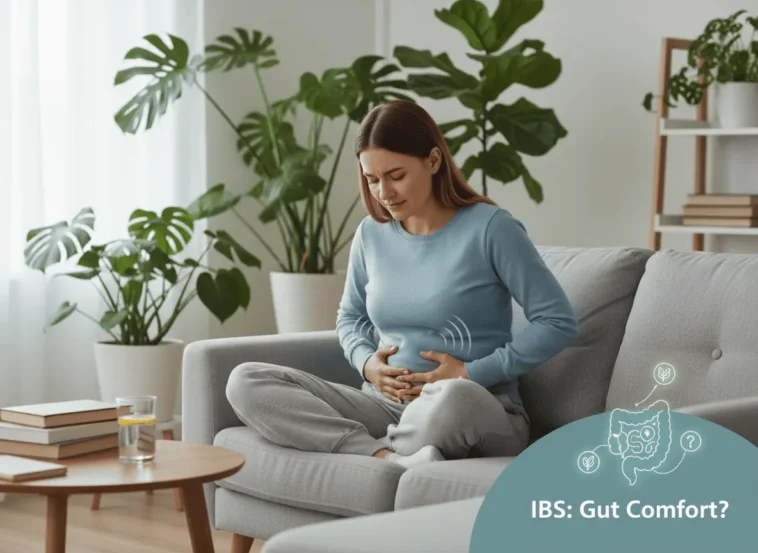Introduction
Irritable Bowel Syndrome (IBS) is one of the most common digestive disorders affecting millions of people worldwide. It’s a chronic condition that affects the large intestine (colon), leading to abdominal pain, bloating, gas, and irregular bowel movements. Although IBS is not life-threatening, it can significantly impact your quality of life if left unmanaged. Understanding the causes and triggers is the first step to relief.
What Is Irritable Bowel Syndrome (IBS)?
IBS is a functional gastrointestinal disorder, meaning that the digestive system looks normal but doesn’t work properly. People with IBS may experience alternating bouts of diarrhea, constipation, or both. It often develops in adulthood and is more common among women than men.
Unlike diseases such as Crohn’s disease or ulcerative colitis, IBS doesn’t cause inflammation or permanent damage to the intestines. However, the discomfort can be very real and distressing.
Common Causes of IBS
The exact cause of IBS isn’t fully understood, but several factors appear to contribute:
- Gut–brain connection: The intestines and brain are linked through the gut–brain axis. Stress and emotional tension can disrupt normal digestive function.
- Abnormal gut motility: Muscles in the colon may contract too quickly (causing diarrhea) or too slowly (causing constipation).
- Food sensitivities: Some people are sensitive to certain foods like dairy, caffeine, wheat, or fatty meals.
- Changes in gut bacteria: An imbalance of healthy bacteria in the gut may lead to IBS symptoms.
- Hormonal fluctuations: Many women notice IBS symptoms worsen during menstruation.
Main Symptoms of IBS
IBS symptoms can vary from person to person but often include:
- Abdominal pain or cramping
- Bloating and excessive gas
- Diarrhea, constipation, or alternating between both
- Mucus in the stool
- A feeling of incomplete bowel movement
Symptoms may appear after eating certain foods or during stressful situations.
How IBS Is Diagnosed
There is no specific test for IBS. Doctors typically diagnose it based on symptoms and by ruling out other conditions. Common diagnostic steps include:
- Reviewing medical history and symptoms
- Blood or stool tests to exclude infections
- Colonoscopy (in some cases) to rule out serious diseases
Treatment and Management of IBS
There is no cure for IBS, but its symptoms can be managed effectively through lifestyle and dietary changes. Here’s how:
1. Dietary Adjustments
- Follow a low-FODMAP diet (reducing fermentable carbohydrates that cause gas).
- Avoid trigger foods like fried meals, spicy foods, caffeine, and alcohol.
- Eat smaller, more frequent meals.
2. Stress Management
Since stress can worsen IBS, relaxation techniques can help:
- Practice yoga, meditation, or breathing exercises.
- Get enough sleep.
- Consider talking to a therapist if anxiety is high.
3. Medications
Your doctor may recommend:
- Antispasmodics to relieve cramping
- Laxatives or fiber supplements for constipation
- Anti-diarrheal medications for loose stools
- Probiotics to balance gut bacteria
4. Lifestyle Tips
- Stay hydrated.
- Exercise regularly.
- Keep a food diary to track triggers.
Natural Remedies for IBS Relief
Many people find relief with natural approaches:
- Peppermint oil capsules can help soothe intestinal muscles.
- Ginger and chamomile tea aid digestion.
- Probiotic-rich foods like yogurt or kefir support gut health.
When to See a Doctor
If your symptoms include weight loss, rectal bleeding, persistent pain, or anemia, consult a doctor immediately. These could signal a more serious condition.
Living With IBS
Managing IBS requires patience and awareness. By identifying triggers, maintaining a healthy lifestyle, and seeking medical guidance, most people can live comfortably and keep symptoms under control. Remember, IBS is manageable — not hopeless.
FAQ Section
Q1: Is IBS a serious disease?
No, IBS is not life-threatening, but it can affect your comfort and quality of life if untreated.
Q2: Can IBS be cured permanently?
There is no permanent cure, but symptoms can be greatly reduced through diet, stress control, and medication.
Q3: What foods should I avoid if I have IBS?
Avoid high-fat meals, spicy food, caffeine, alcohol, and dairy (if lactose intolerant).
Q4: Does exercise help IBS?
Yes, regular physical activity can improve digestion and reduce stress — two key IBS triggers.
Conclusion
Irritable Bowel Syndrome (IBS) is a common yet manageable digestive condition. By combining healthy eating, stress reduction, and medical support, you can take control of your gut health and live a balanced life.




GIPHY App Key not set. Please check settings